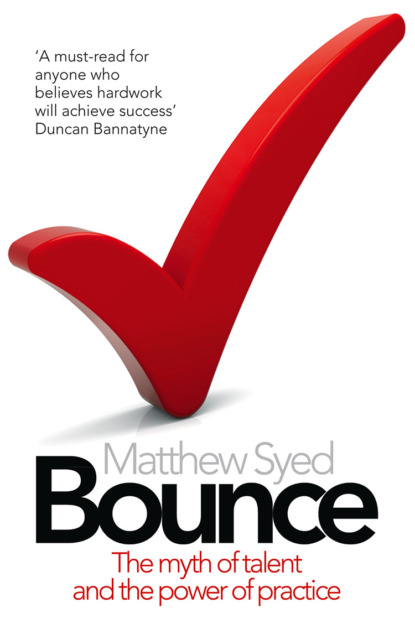По всем вопросам обращайтесь на: info@litportal.ru
(©) 2003-2024.
✖
Bounce: The Myth of Talent and the Power of Practice
Автор
Год написания книги
2019
Настройки чтения
Размер шрифта
Высота строк
Поля
How good are you at mental arithmetic? I’m guessing that you have a pretty clear answer to this question. Maths is one of those things you either can do or can’t. You either have a brain for numbers, or you don’t. And if you don’t, you may as well give up.
The idea that calculating ability is predetermined at birth is, perhaps, even more deeply ingrained than the idea that sporting ability is predetermined at birth. It represents the ultimate expression of the talent theory of expertise. For that reason, it is worth taking a closer look to see if things are quite as they seem.
As so often, the talent theory of calculating skill finds its most eloquent testimony in the abilities of child prodigies: young boys and girls who perform mental arithmetic at speeds approaching that of computers. Like the six-year-old Mozart, these kids are so remarkable that they often perform to enraptured audiences.
Shakuntala Devi, born in Bangalore in 1939, for example, stunned university academics in India by performing three-digit multiplications at the age of eight. She is now in the Guinness Book of Records for being able to multiply two thirteen-digit numbers (for example, 8574930485948 times 9394506947284) in twenty-eight seconds.
Rüdiger Gamm, from Germany, another world-famous ‘human calculator’, is able to calculate ninth powers and fifth roots with incredible accuracy, and to find the quotient of two primes to sixty decimal places. It is remarkable to watch Gamm in action. When asked a question, he closes his eyes and furrows his brow, his eyelids flickering intensely as he grapples with the calculation. A few moments later he opens his eyes, and the numbers spew out at astonishing speed.
Surely these feats speak of natural gifts beyond those bestowed on the rest of us. Or do they?
In 1896 Alfred Binet, a French psychologist, carried out a simple experiment to find out. He compared the performance of two calculating prodigies with cashiers from the Bon Marché department store in Paris. The cashiers had an average of fourteen years experience in the store but had showed no early gift for mathematics. Binet gave the prodigies and the cashiers identical three- and four-digit multiplication problems and compared the time taken to solve them.
What happened? You guessed it: the best cashier was faster than either prodigy for both problems. In other words, fourteen years of calculating experience had been sufficient, on its own, to bring perfectly ‘normal’ people up to and beyond the remarkable speed of prodigies. Binet concluded that calculating ability is more about practice than talent – which means that you and I could perform lightning-quick multi-digit calculations if we had the proper training.
So, how is it done? As with most ‘miraculous’ feats, there is a trick. Suppose, for example, that you had to multiply 358 and 464. Now, most of us can multiply 300 and 400 to get 120,000. The trick is to commit that number to memory while solving the next component of the problem, say, 400 times 50. This is 20,000, which you add to the running total to get 140,000. Now multiply 400 by 8 to get 320, and add that to the running total, to get 140,320.
Eventually, by adding the remaining components of the calculation (there are eighteen separate steps), you get the answer: 166,112. This is still a formidable feat, of course, but it is no longer the calculation that is daunting; it is remembering the running total while performing the various steps.
But now consider how much more difficult it is to keep track of a narrative while reading a book. There are tens of thousands of words in the English language, and they are used in new and unforeseen combinations in every sentence of every page. To understand a new sentence, the reader must not only understand its specific meaning, he must also be able to integrate it with all sentences previously read. He must, for example, remember previously mentioned objects and people in order to resolve references to pronouns.
This is a memory task of almost unimaginable dimensions. And yet most of us are able to get to the last word of the book – comprising hundreds of pages and tens of thousands of words – without once losing the thread of the narrative. The experience we have clocked up as ‘language-users’ enables us to do this in just the same way that the hours clocked up as ‘number-users’ enables mathematicians to get to the end of a multi-digit multiplication by keeping track of the ‘narrative’ of the calculation.
Вы ознакомились с фрагментом книги.
Приобретайте полный текст книги у нашего партнера:
Приобретайте полный текст книги у нашего партнера:





